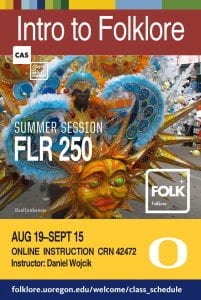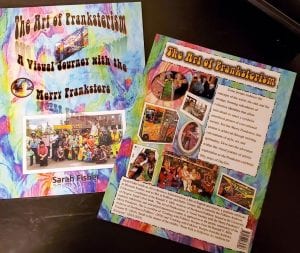News
Winter 2020 Folklore/Legend Course
Check out this winter 2020 course taught by Folklore and Public Culture faculty member Gantt Gurley. It deals with narrative theory, orality and literacy, and the folkloresque. FLR grad students are encouraged to enroll. It’s listed in German but will be taught in English and all readings will also be available in English and German See flier for details.
The Art of the Interview – UO Contributors
Riki Saltzman and Emily West Hartlerode of the Oregon Folklife Network are two of the co-authors of the paper Interview as Curriculum and Collaboration: Behind the Scenes of the Confederated Tribes of Warm Springs Field School in a new special issue of the 2019 Journal of Folklore and Education on “the art of the interview.” This collection of papers focuses on approaches and methods for engaged and sensitive ethnography in diverse settings.
The issue also includes a remembrance of UO Folklore alum and benefactor Carol Spellman as well as her guide The Artful Interview in Documentary Production.
Check out the entire collection here. You can download the full issue as a PDF.
New Course this Fall: South Asian Folklore
Still time to register for this new course offered by Prof. Leah Lowthorp, Anthropology and Folklore and Public Culture Program.
Fall term registration remains open through September 22nd and is then closed to undergraduate students Sep 23 at 10 a.m. through September 27 at 8:30 a.m.
Summer Term 2019 Course
Still time to register for –
Summer Session 8/19-9/15
FLR 250 Introduction to Folklore w/ Prof. Daniel Wojcik (WEB)
This course introduces students to the research questions, theoretical orientations, and fieldwork methods used to study folklore, and therefore satisfies the Arts and Letters group requirements. Students will examine concepts that are central to folkloristic inquiry, survey the social groups and folklore genres that have preoccupied folklorists, investigate the meanings and functions of folklore, and explore relationships between folklore and social issues. The course provides an overview of research methods and theories of culture, and explores topics such as narrative, genre, identity, gender, race, and ethnicity as these apply to everyday life, and the meanings of cultural heritage and expression in cross-cultural perspectives. Students will develop critical thinking and research skills, as well as their abilities to communicate orally and in writing, and will be given the tools and opportunity to document and analyze folkloric expression through interviews, fieldwork, and a research paper.
The Art of Pranksterism: A Visual Journey with the Merry Pranksters
Folklore alum Sarah Fisher has a book coming out May 5 – The Art of Pranksterism: A Visual Journey with the Merry Pranksters.
See: https://store.bookbaby.com/book/The-Art-of-Pranksterism
Some people embrace the concepts of the weird, the odd, and the strange, forming subcultures of collective identities that allow individuals to enact a symbolic anarchical protest of conventional society. For the Merry Pranksters, this protest is achieved through twisting conventions of style, art, and spirituality. Dive into the adventure within this visual journey of artistic exploration as the Pranksters celebrate fifty years of DayGlo. This community evinces elements of subcultural identity, allowing for a conceptual analysis of the folklore found within the culture.
Using a comparative behavioral approach, “The Art of Pranksterism” defines the elements of the Merry Prankster subculture that began with Ken Kesey and his friends in the 1960s. It goes on to investigate how members of the subculture use art and costumes to express individuality while evoking communitas within the subculture. While many scholars consider the individual desire to participate in a community that joins together during festivals, “The Art of Pranksterism” focuses on what compels some people to “drop out” of society when joining or identifying with subcultures. An exploration of festivals draws on performance theory, subcultural theory, and religious folklore. And while previous research focuses on the history of the Pranksters, “The Art of Pranksterism” instead focuses on the continuation of the Prankster subculture through community and art.
Sarah Fisher holds degrees in Business Administration, English, History, Museum Studies, plus Folklore and Public Culture. She is currently the Folklore Archivist Collection Coordinator at the Randall V. Mills Archives of Northwest Folklore. She is co-editor of “Cooking with Folklore: Recipes from the Randall V. Mills Archives of Northwest Folklore” (2018). “Cooking with Folklore: Recipes from the Archives, Volume II” is currently in the editing process, to be published in Fall 2019. She is the curator of the exhibit “From Folk to Folklorist: An Archives for Everyone” (2018-2019) on display in the Knight Library at the University of Oregon.


